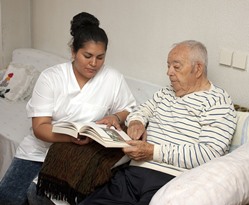How to Select the Right LPN College near Birmingham Alabama
 There are essentially two scholastic credentials offered that provide education to become an LPN near Birmingham AL. The one that may be completed in the shortest time period, commonly about one year, is the certificate or diploma program. The 2nd choice is to earn a Practical Nursing Associate Degree. These LPN programs are more comprehensive in nature than the diploma option and usually require 2 years to complete. The benefit of Associate Degrees, aside from providing a higher credential and more extensive training, are that they provide more transferable credit toward a Bachelor’s Degree in nursing. Regardless of the kind of credential you seek, it should be state approved and accredited by the National League for Nursing Accrediting Commission (NLNAC) or any other national accrediting organization. The NLNAC guarantees that the syllabus effectively prepares students to become Practical Nurses, and that most graduates pass the 50 state required NCLEX-PN licensing exam.
There are essentially two scholastic credentials offered that provide education to become an LPN near Birmingham AL. The one that may be completed in the shortest time period, commonly about one year, is the certificate or diploma program. The 2nd choice is to earn a Practical Nursing Associate Degree. These LPN programs are more comprehensive in nature than the diploma option and usually require 2 years to complete. The benefit of Associate Degrees, aside from providing a higher credential and more extensive training, are that they provide more transferable credit toward a Bachelor’s Degree in nursing. Regardless of the kind of credential you seek, it should be state approved and accredited by the National League for Nursing Accrediting Commission (NLNAC) or any other national accrediting organization. The NLNAC guarantees that the syllabus effectively prepares students to become Practical Nurses, and that most graduates pass the 50 state required NCLEX-PN licensing exam.
What is an LPN?
 Licensed Practical Nurses have many different functions that they complete in the Birmingham AL health care facilities where they practice. As their titles signify, they are required to be licensed in all states, including Alabama. Even though they may be accountable for monitoring Certified Nursing Assistants (CNA), they themselves generally work under the guidance of either an RN or a doctor. The healthcare facilities where they work are numerous and diverse, such as hospitals, medical clinics, schools, and long-term care facilities. Virtually any place that you can encounter patients seeking medical treatment is their dominion. Every state not only controls their licensing, but also what duties an LPN can and can’t perform. So depending on the state, their everyday work functions can include:
Licensed Practical Nurses have many different functions that they complete in the Birmingham AL health care facilities where they practice. As their titles signify, they are required to be licensed in all states, including Alabama. Even though they may be accountable for monitoring Certified Nursing Assistants (CNA), they themselves generally work under the guidance of either an RN or a doctor. The healthcare facilities where they work are numerous and diverse, such as hospitals, medical clinics, schools, and long-term care facilities. Virtually any place that you can encounter patients seeking medical treatment is their dominion. Every state not only controls their licensing, but also what duties an LPN can and can’t perform. So depending on the state, their everyday work functions can include:
- Checking vital signs
- Giving medications
- Setting up IV drips
- Monitoring patients
- Getting blood or urine samples
- Taking care of patient records
- Supporting physicians or RNs with procedures
In addition to their occupational functions being controlled by each state, the health facilities or other Birmingham AL healthcare providers where LPNs work can further limit their job duties within those parameters. In addition, they can practice in various specialties of nursing, which include long-term care, critical care, oncology and cardiology.
LPN Programs Online
 Enrolling in LPN schools online is growing into a more popular way to get instruction and earn a nursing certificate or degree in Birmingham AL. Many schools will require attending on campus for a component of the training, and virtually all programs require a certain amount of clinical rotation hours carried out in a local healthcare center. But since the balance of the training may be accessed online, this alternative may be a more practical approach to finding the free time to attend college for some students. Regarding tuition, some online degree programs are cheaper than other on campus choices. Even supplemental expenses such as for commuting and study materials may be reduced, helping to make education more economical. And numerous online programs are accredited by U.S. Department of Education recognized organizations. Therefore if your job and family responsibilities have left you with little time to pursue your academic goals, it could be that an online LPN program will make it easier to fit a degree into your busy schedule.
Enrolling in LPN schools online is growing into a more popular way to get instruction and earn a nursing certificate or degree in Birmingham AL. Many schools will require attending on campus for a component of the training, and virtually all programs require a certain amount of clinical rotation hours carried out in a local healthcare center. But since the balance of the training may be accessed online, this alternative may be a more practical approach to finding the free time to attend college for some students. Regarding tuition, some online degree programs are cheaper than other on campus choices. Even supplemental expenses such as for commuting and study materials may be reduced, helping to make education more economical. And numerous online programs are accredited by U.S. Department of Education recognized organizations. Therefore if your job and family responsibilities have left you with little time to pursue your academic goals, it could be that an online LPN program will make it easier to fit a degree into your busy schedule.
LPN Salary
According to the Bureau of Labor Statistics, the median annual wage for Licensed Practical Nurses (LPN) was $45,030 in May 2017. The median wage is the wage at which half the workers in an occupation earned more than that amount and half earned less. The lowest 10 percent earned less than $32,970, and the highest 10 percent earned more than $61,030. Most licensed practical nurses near Birmingham AL work full time, although about 1 in 5 worked part time in 2016. Many work nights, weekends, and holidays, because medical care takes place at all hours. They may be required to work shifts of longer than 8 hours. Employment of LPNs is projected to grow 12 percent from 2016 to 2026. Job prospects should be favorable for LPNs who are willing to work in rural and medically under served areas.
Questions to Ask LPN Schools
 Now that you have decided on obtaining your LPN certificate, and if you will attend classes on campus or on the web, you can utilize the following checklist to start narrowing down your choices. As you probably are aware, there are a large number of nursing schools and colleges near Birmingham AL as well as within Alabama and throughout the United States. So it is necessary to lower the number of schools to choose from to ensure that you will have a manageable list. As we earlier discussed, the site of the school as well as the cost of tuition are most likely going to be the initial two factors that you will take into consideration. But as we also stressed, they should not be your sole qualifiers. So prior to making your ultimate selection, use the following questions to evaluate how your pick measures up to the other programs.
Now that you have decided on obtaining your LPN certificate, and if you will attend classes on campus or on the web, you can utilize the following checklist to start narrowing down your choices. As you probably are aware, there are a large number of nursing schools and colleges near Birmingham AL as well as within Alabama and throughout the United States. So it is necessary to lower the number of schools to choose from to ensure that you will have a manageable list. As we earlier discussed, the site of the school as well as the cost of tuition are most likely going to be the initial two factors that you will take into consideration. But as we also stressed, they should not be your sole qualifiers. So prior to making your ultimate selection, use the following questions to evaluate how your pick measures up to the other programs.
- Accreditation. It’s a good idea to make sure that the certificate program along with the school are accredited by a U.S. Department of Education acknowledged accrediting organization. In addition to helping ensure that you receive an excellent education, it may assist in securing financial aid or student loans, which are often not provided for non-accredited schools near Birmingham AL.
- Licensing Preparation. Licensing requirements for LPNs vary from state to state. In all states, a passing score is needed on the National Council Licensure Examination (NCLEX-PN) in addition to graduation from an accredited school. Many states require a specified number of clinical hours be completed, as well as the passing of additional tests. It’s essential that the school you are enrolled in not only provides an exceptional education, but also readies you to satisfy the minimum licensing standards for Alabama or the state where you will be practicing.
- Reputation. Look at online rating services to see what the assessments are for each of the LPN schools you are looking into. Ask the accrediting agencies for their reviews also. In addition, check with the Alabama school licensing authority to find out if there are any complaints or compliance issues. Finally, you can call some local Birmingham AL healthcare organizations you’re interested in working for after graduation and ask what their opinions are of the schools as well.
- Graduation and Job Placement Rates. Find out from the LPN programs you are looking at what their graduation rates are as well as how long on average it takes students to finish their programs. A low graduation rate may be an indication that students were dissatisfied with the program and dropped out. It’s also imperative that the schools have high job placement rates. A high rate will not only verify that the school has a favorable reputation within the Birmingham AL healthcare community, but that it also has the network of relationships to help students obtain employment.
- Internship Programs. The most effective way to acquire experience as a Licensed Practical Nurse is to work in a clinical setting. Almost all nursing degree programs require a certain number of clinical hours be completed. Various states have minimum clinical hour mandates for licensing as well. Ask if the schools have a working relationship with nearby Birmingham AL community hospitals, clinics or labs and help with the placing of students in internships.
Enrolling in an LPN Program near Birmingham AL?
If you are considering enrolling in and attending an LPN school near Birmingham AL, you may find the following information both interesting and useful when making your final decision.
Birmingham, Alabama
Birmingham (/ˈbɜːrmɪŋhæm/ BUR-ming-ham) is a city located in the north central region of the U.S. state of Alabama. With an estimated 2017 population of 210,710, it is the most populous city in Alabama.[4] Birmingham is the seat of Jefferson County, Alabama's most populous and fifth largest county. As of 2017, the Birmingham-Hoover Metropolitan Statistical Area had a population of 1,149,807, making it the most populous in Alabama and 49th-most populous in the United States. Birmingham serves as an important regional hub and is associated with the Deep South, Piedmont, and Appalachian regions of the nation.
Birmingham was founded in 1871, during the post-Civil War Reconstruction era, through the merger of three pre-existing farm towns, most notably Elyton. The new city was named for Birmingham, England, the UK's second largest city and, at the time, a major industrial city. The Alabama city annexed smaller neighbors and developed as an industrial center, based on mining, the new iron and steel industry, and rail transport. Most of the original settlers who founded Birmingham were of English ancestry.[5] The city was developed as a place where cheap, non-unionized immigrant labor (primarily Irish and Italian), along with African-American labor from rural Alabama, could be employed in the city's steel mills and blast furnaces, giving it a competitive advantage over unionized industrial cities in the Midwest and Northeast.[6]:14
From its founding through the end of the 1960s, Birmingham was a primary industrial center of the southern United States. Its growth from 1881 through 1920 earned it nicknames such as "The Magic City" and "The Pittsburgh of the South". Its major industries were iron and steel production. Major components of the railroad industry, rails and railroad cars, were manufactured in Birmingham. Since the 1860s, the two primary hubs of railroading in the "Deep South" have been Birmingham and Atlanta. The economy diversified in the latter half of the 20th century. Banking, telecommunications, transportation, electrical power transmission, medical care, college education, and insurance have become major economic activities. Birmingham ranks as one of the largest banking centers in the U.S. Also, it is among the most important business centers in the Southeast.
Pick the Right LPN Program near Birmingham AL
 Enrolling in the ideal Licensed Practical Nurse program is perhaps the most crucial first step to starting a new career in the healthcare field. There are various factors that you must think about when choosing a nursing school. These variables will be prioritized differently depending on your current career objectives, lifestyle, and financial situation. As we have pointed out within this post, it is critical that you pick an LPN school and a certificate or degree program that are each accredited and have excellent reputations within the medical community. You originally decided to visit this website because of an interest in LPN Courses Online. However, by using our checklist of qualifying questions, you will be able to create a shortlist of schools to pick from so that you can make your ultimate selection. And with the appropriate degree and training, combined with your hard work and ambition to succeed, you can become a Licensed Practical Nurse in Birmingham AL.
Enrolling in the ideal Licensed Practical Nurse program is perhaps the most crucial first step to starting a new career in the healthcare field. There are various factors that you must think about when choosing a nursing school. These variables will be prioritized differently depending on your current career objectives, lifestyle, and financial situation. As we have pointed out within this post, it is critical that you pick an LPN school and a certificate or degree program that are each accredited and have excellent reputations within the medical community. You originally decided to visit this website because of an interest in LPN Courses Online. However, by using our checklist of qualifying questions, you will be able to create a shortlist of schools to pick from so that you can make your ultimate selection. And with the appropriate degree and training, combined with your hard work and ambition to succeed, you can become a Licensed Practical Nurse in Birmingham AL.
More Practical Locations in Alabama
